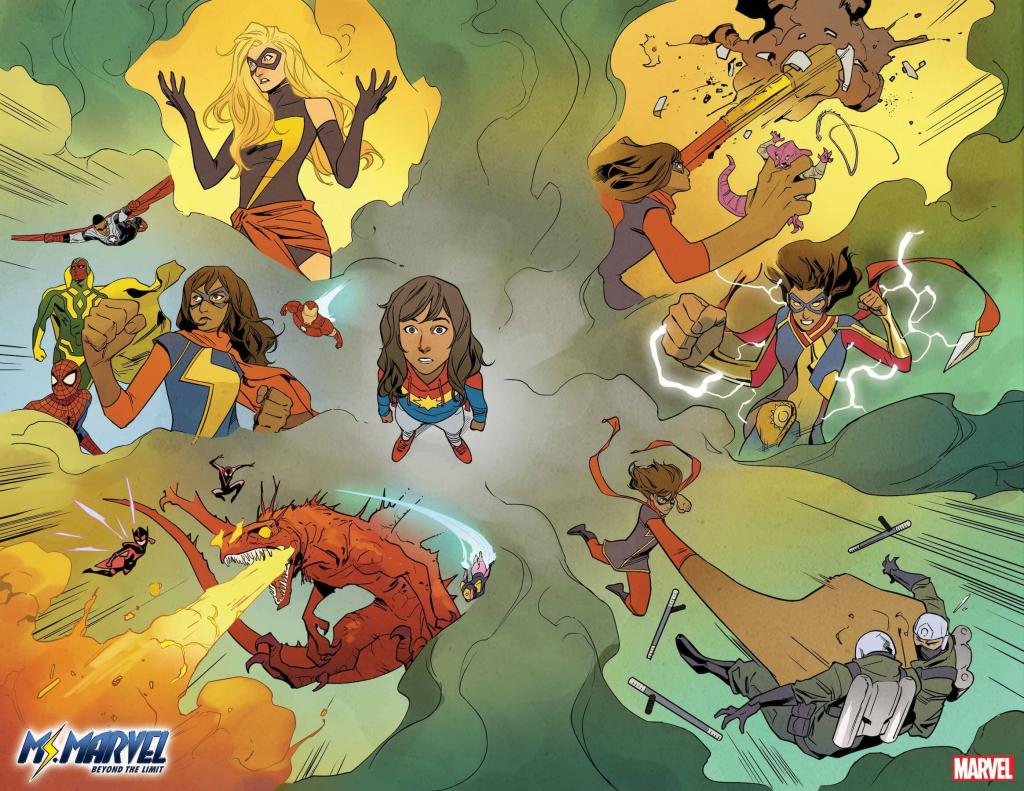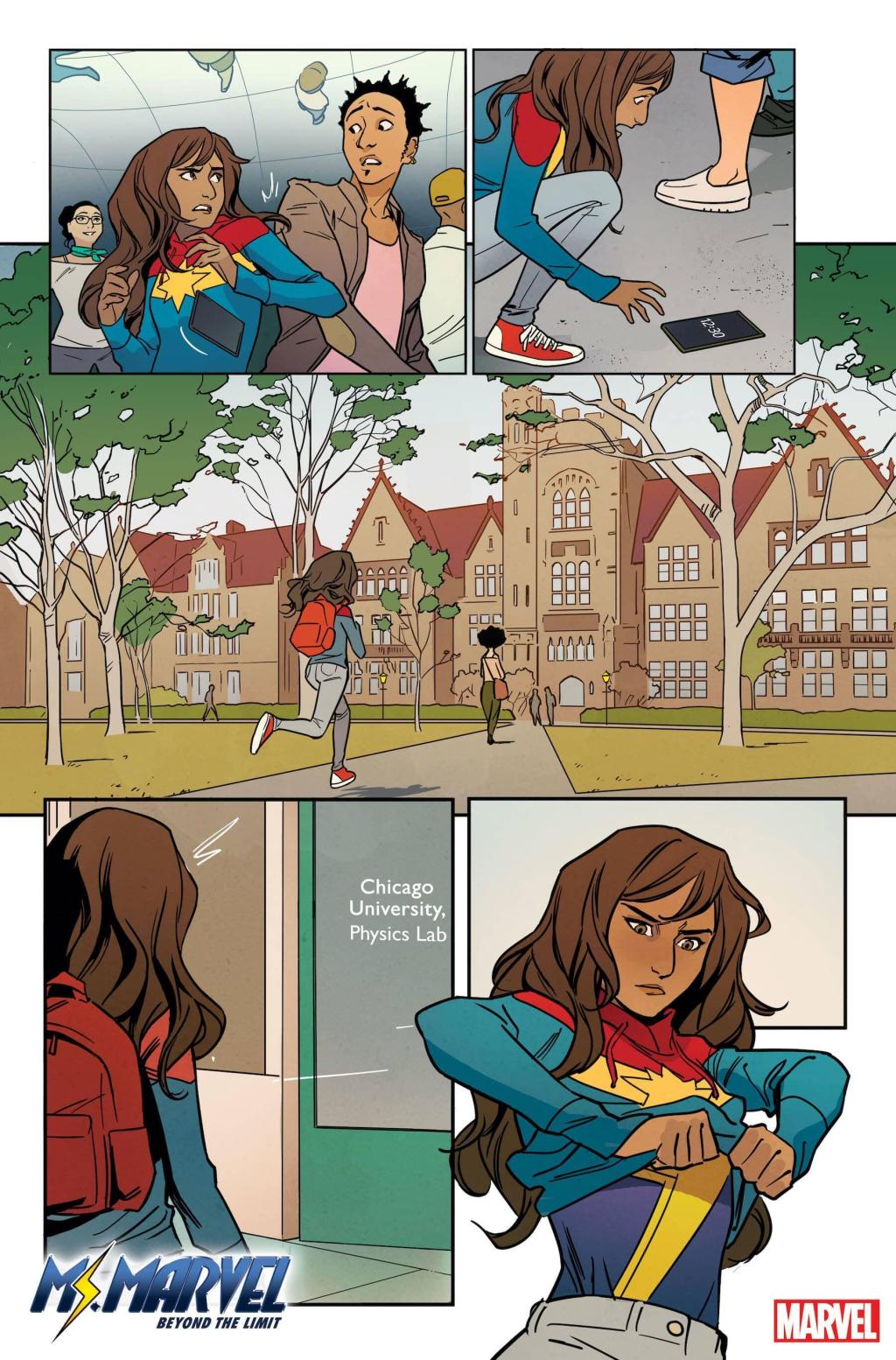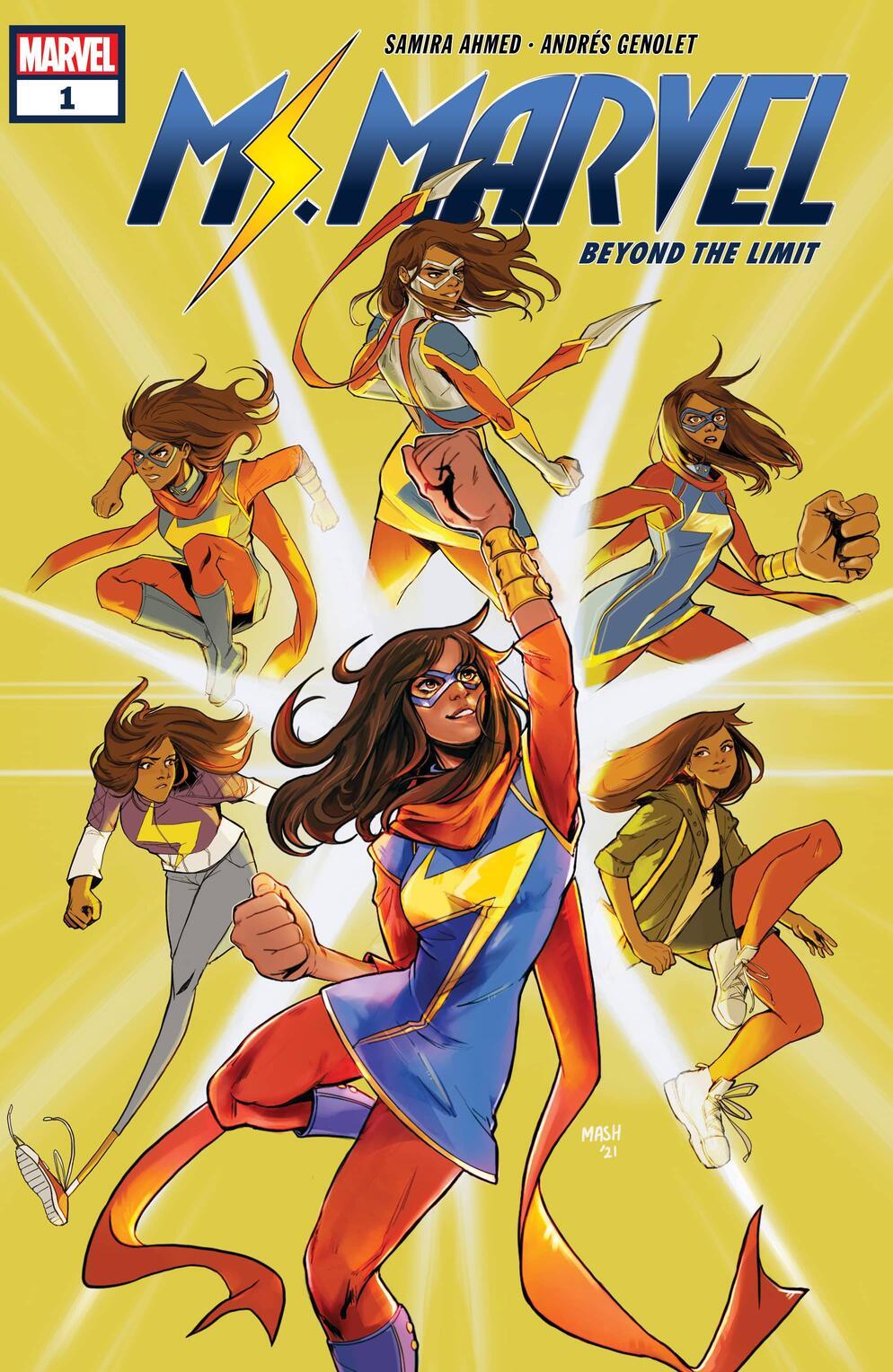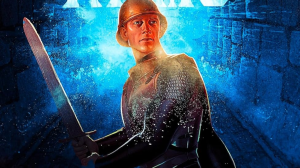Kamala Khan is embarking on a new adventure in Ms. Marvel: Beyond the Limit, a five-issue miniseries from New York Times best-selling author Samira Ahmed (Love, Hate, & Other Filters, Internment, Mad, Bad, & Dangerous to Know) and Runaways artist Andrés Genolet. The future MCU hero finds herself mixed up in a multiverse adventure that introduces many different variants of the young hero. Ahmed, who admits she’s a huge Ms. Marvel fan, makes her Marvel Comics debut with the miniseries. Known for crafting compelling young adult novels with diverse protagonists, Ahmed talked to ComicBook.com about the reaction to the comic, diving into the Marvel multiverse, Ms. Marvel’s powers, and more.
Videos by ComicBook.com
ComicBook.com: So after reading the announcement for the new series, it’s obvious you’re a huge Ms. Marvel fan. How did you land the gig for writing this new adventure for her?
Samira Ahmed: I would say fate. Destiny. It was basically just some conversations. I’d been talking to my agent about how, “Wouldn’t it be such a dream, if one day I could write Ms. Marvel?” And actually, this is something I’d been thinking about since G. Willow Wilson left… Well, actually even before, because I was like, “Eventually Willow will probably leave the run. Maybe one day I could get to do it.” And then because my agent also had been working with Marvel on other things, and Lauren Bisom, my editor at Marvel, had read my young adult novels. It was sort of like synchronicity because the conversation… It was like things lining up perfectly and it was a little bit organic. So it was kind of cool the way it happened.
And what’s it been like to play around in Marvel’s sandbox?
Honestly, it’s amazing. I’m still walking around like, “I write for Marvel.” It’s so cool. And I love, especially, the reaction that I get from kids in my neighborhood. So, some of the kids in my neighborhood know that I write middle-grade fiction, I write young adult fiction. And then when they found out I was writing at Marvel, it was funny because I even had kids I don’t know… Like I was passing this school and this girl stopped me. I think she was like a middle school kid. And she said, “Hey, hey. Are you Samira?” And I said, “Yeah.” And she goes, “My brother told me you’re going to be writing Ms. Marvel. Is that true?” And I said, “Yeah.” And she’s like, “Okay, that’s cool.” And I was like, “Okay, thanks.”
But, honestly, that kind of encapsulates how awesome of an experience it’s been. I was a high school teacher. I write for young people. And so now to able to write this incredible hero, this Muslim South Asian hero, I still kind of get goosebumps when I think about the fact that I get to do this. So you can probably tell from my voice that I have a lot of enthusiasm for it.
And aside from being able to write this incredible character, it’s also been really cool just to learn how comics come to life. It’s a very different process, obviously, than writing a novel. When you’re writing a novel, it’s a pretty solitary process for a very long time, until you are doing revisions with your editor. But with writing Ms. Marvel, one of the things I really loved about it is how collaborative it is and just the back and forth with my editors and also with Andrés, with the art, which by the way is amazing. And also I’ve always had this incredible respect for artists, but now that I see how the artist takes my words and literally brings them to life on the page, it’s just such a cool experience to watch that happen, that act of creation happening before your eyes. And I really just enjoy the collegiality, working with this character that we all love.

You said you were a high school teacher. How long were you a teacher and what subject was it?
II taught high school English for seven years. I taught in the suburbs of Chicago and also in New York City public schools.
Okay. My wife’s a college professor. And I used to work in the IT department of a private college, so have a little familiarity with it.
Being a teacher really, I think, influenced a lot of my writing. I really feel so privileged to be able to write this character for young people. Ms. Marvel, she’s an icon, but what’s so cool about her is she’s a girl, like all the other girls, right? She has a family that she loves, but then sometimes butts heads with because their expectations don’t always match up and then she has a crush, but then she doesn’t have a crush. And then, “Oh, wait, I have a crush on this other guy.” And, “Oh no, awkward.” She has friends who will tell her, especially Nakia, will tell her the truth as it is, don’t pull any punches with her.
And so she is a regular high school kid with a really extraordinary job and I feel so honored to be able to write her and to really work with characters that impact the lives of young people and that are part of their lives. I think it’s really a privilege to be able to write for young people.
You mentioned how some of the kids in the neighborhood are excited about hearing that you’re writing Ms. Marvel. Are they more familiar with her from the comics, or are they even aware she’s going to have a streaming show in the future?
Oh, they know she’s going to have a show. It’s funny because when you’re outside of the world, when you’re not in the weeds and doing the work, you don’t quite understand the process. I didn’t understand the process until I was literally doing it and Marvel was giving me the one-on-one and is like, “Samira, this is how you do it.”
So everyone thinks, especially the kids, they’re all asking me to do certain things in the show. And I was like, “Well, you guys that’s different. I don’t know anything that’s happening with the show.” I said, “That’s the Marvel Cinematic Universe. I’m writing the comics. But if you want to give me your suggestions for the comics, go for it.” And they’re always great. The suggestions are always hilarious. Some of them are just everyday things. Some of them are like, “I really like how much she can eat.” There’s this one kid who’s like, “Yeah, I really like that food is like her power, like her fuel.” Because it kind of has that old spinach, Popeye element to it. I’m sure parents have been saying this forever, like, “Eat your vegetables,” and, “Eat your spinach,” and all this. But Ms. Marvel is a character who really is fueled up by that. I just find it hilarious how many kids have talked to me about that particular element.
I also get suggestions about how she should embiggen. Because they want it to be fists, but they also want it to be like, “Can she go really flat, like a net?” And, “Can she do this?” I just think it’s fun because I’m like, “Well actually, yeah, she could. And there’s been some issues where she’s done that.” So it’s really fun to be able to talk to young people about it. They’re excited.
Their minds work in different ways because sometimes, as adults, we try to overanalyze things too much and kids can come from it from a different angle, just being like, “Think of it this simple way.” Like you said, just focusing on how she likes to eat.
I know. It’s actually really funny. I like how she eats too. That’s why I try to include little bits of Pakistani foods and things like that in there. But also kids, they don’t have the same filters as adults and their imaginations are just bigger than ours, which I think is one of the greatest parts of childhood. And it’s something that reading comics contributes to so much, because when we say, “input is output,” when kids are reading, I just think it’s cool to see how those light bulbs go off and it makes them see connections or makes them see the world in different ways and makes them think, “Well, maybe there are ways that I can be a hero too.”
But a couple of kids in the neighborhood, since I live in Chicago, are like, “Can Riri make an appearance?” And they also want Miles [Morales]. They like the crossovers and mashups. So yeah, I’m getting a lot of requests for Miles and for Riri.

So the first issue’s out, obviously, and it addresses the multiverse, which is playing a big element in the comics and the movies and TV shows. Is the multiverse something you’re a fan of and does what type of storytelling opportunities does it open up for you?
So I 100% love the multiverse. I even have bought a couple of physics books about the possibilities of multiverse string theory, all this stuff, because I think it’s sort of cool. I think what is so interesting about it is that, as human beings, we always wonder about the what-ifs. What if I had chosen X instead of Y or gone on this path instead of this? And the multiverse is one cool way to explore that. Well, what if there was this world where I chose that X instead of the Y and what would happen, what would be different? And it’s just so interesting to think, “Well, could there be other versions of me and what could I be. Maybe in this multiverse or maybe on this earth, they have flying cars. Maybe on this one, I’m a bad guy. Maybe on this one, all the food is just desserts and you don’t get rotten teeth from it.”
I just think that it’s fun to be able to explore the possibilities. And I think one of the cool things about writing for teens and writing young adult characters is that they exist in what I call the realm of possibility because you’re kind of on this cusp between childhood and adulthood and it’s this really cool space. And I think of it so much as there are all these doors in front of you and you are making choices which door you’re going to open. Now, some doors might not be right. Some doors you might open and think like, “I don’t want to be down that door.” Some doors might be hard to open. And then sometimes you might come across the door that you feel is perfect for you. And when I think about that sort of metaphor of young adulthood, that fits so well into the multiverse because it’s all these doors and each of these doors is leading into another world. So I love being able to explore those what-ifs.
Did you and Andrés work together to come up with all the different variants of Ms. Marvel that we saw in the first issue?
Aren’t those so cool? That page is so amazing. Yes, basically I said, “Well, can we have kind of a punk version of Ms. Marvel?” And that was kind of playing into my Gen X childhood and youth. And then we were like, “Well, what could be some other ones?” So Andrés and I and my editors, Lauren and Caitlin [O’Connell], we sort of brainstormed different, cool possibilities. So I think it was fun. Honestly, we probably could have come up with even more, but we could only fit so many on the page.
And you’re getting to expand on Ms. Marvel’s powers and origins a little bit in the story.
We’re going to explore it a little bit. I’m trying to make sure I don’t give away any spoilers. The next one’s coming out, I think next week, but when that moment happens with the Polchinski box where it sort of goes up and we know that it’s kind of creating a wormhole that lets her see all these different possibilities. I think it’s going to be interesting for her to really think about her power and the source of her power. And I also wanted to put that piece in, because I like that it’s kind of a call back to Willow’s run where there was the issue where Bruno is figuring out her powers, where he and Kamala are working together to figure out, “How exactly does this thing work?” I like to call it Marvel physics.
I just think it’s so interesting, that whole thing of borrowing from her possible futures, because it’s not a multiverse in the sense that it’s different earths, but it’s her earth, but the possible things that could happen to her and borrowing matter from that. And we know in physics, there’s conservation of mass and conservation of energy, so what does that mean? So I’m very fascinated by that and I think it’s natural for her to be interested in it too.
And so you’re raising these new questions about her powers. Will fans also get some answers to her powers as the series moves along?
Well, we do know how her powers work, but I think what fans will see is… I’m just trying to make sure I don’t do spoilers. I think what fans will see is her exploring those powers, her thinking about what it means, what the source of her powers means and there will be some answers. There’ll be some revelations. Let’s put it that way.

I’ve read how Ms. Marvel often comes up in your group chats with your cousins. Are there any funny stories or anecdotes you can share about how some of those chats came about?
Well, you know what? It’s funny because we would joke around about like, “What would Ms. Marvel do?” Because she’s desi Muslim, like all of us are. And I think… Trying to think of something that I can say without having asked permission of my cousins to talk about this or my sisters. There is a lot of food talk. I’ll just put it vaguely so I don’t give away any inside secrets. So there’s always this sort of jokey thing about aunties and how they’re never satisfied by what you’ve done. Like, “Okay, fine. You are a New York Times bestseller, Samira, but you didn’t become a doctor.” Or, “You’re not eating enough.” Or, “Why you’re having so many sweets?” There’s always something where you’re like, “Oh my God, just be happy with what I am.”
And then there were these jokes, it was after this one wedding and there were jokes about how, even if she was there and everyone knew that she was a superhero, they would still be like, “Yes, but are you going to be pre-med?” It doesn’t matter how successful you are. “If you’re not pre-med, are you going to at least be a lawyer or an engineer?” So we kind of were joking about how the bar is always so high. And then we always rib each other because we’re like, “Okay, fine. You did this. Now it’s going to make it so much worse for the rest of us.”
Would you like to continue working in the comic book medium?
I’ve been loving it so far, so I hope so. I love Ms. Marvel. What I really love right now is I think comics have always been important, but I feel like right now there’s just so much cool stuff out there. Again, this goes back to me being a high school teacher, but I see how comics and graphic novels are really capturing kids’ imaginations and just compelling them to read. They’re just like, “This is awesome. I want to read all of this.” And I see young kids just tearing through a bind-up and just being so excited about it. And obviously that’s something that I would love to continue doing. It’s an amazing medium. And I love how it brings together both the visual and the words to create the story.
What I think is so interesting is that it has your mind working in a couple of different ways because you’re seeing the words, and so that’s just the reading part that’s telling the story, and then you’re combining it with the visuals. And I just love how it sets those synapses on fire to look at how the story is told in this combined way. And it’s different than film, for example, because in comics you have both the written word and the art and it’s different than novels, because that’s where you just have the written word. I love writing books and I love writing comics, so hopefully I continue to do both.








